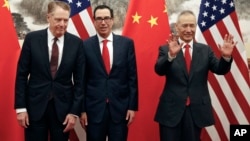U.S. President Donald Trump's intention to further hike U.S. tariffs on Chinese goods has alarmed American lawmakers of both parties who fear dire economic consequences from escalating tensions between the United States and its trading partners.
"I'm anxious for the tariff war to come to an end," Republican Sen. Jerry Moran of agriculturally rich Kansas told VOA on Tuesday. "Exports are very important to the economy of my state. I would encourage the rapid resolution between the United States and China, because it has an immediate and consequential effect on the livelihoods of lots of people."
"The [president's] whole tariff policy has been dangerous folly," New Jersey Democratic Sen. Robert Menendez said. "I hear it from New Jersey companies that recently, just this past week, told me about tariffs they have to pay on particular products that they can't get anywhere else [but foreign suppliers]."
Who's paying?
On Sunday, Trump announced that tariffs on $200 billion of Chinese goods would rise from 10% to 25% as of Friday. He tweeted that "China has been paying" U.S. tariffs and that China's "payments are partially responsible for our great economic results."
Such assertions are disputed by many lawmakers, including Republicans who, on other matters, often come to the president's defense.
"Currently, U.S. importers have paid the U.S. government over $16 billion in tariffs on imports from China," Oklahoma Republican Sen. James Lankford said via Twitter. "This tax is not paid for by Chinese exporters, this is all paid by U.S. importers."
Trade talks to continue
Despite Trump's tariff threat, Chinese officials have signaled they intend to continue trade discussions with Washington, prompting some lawmakers to applaud what they see as the White House's hardball negotiating stance toward Beijing.
"The only reason that China is at the [negotiating] table is because of these tariffs, let's not kid ourselves," Republican Sen. John Kennedy of Louisiana said. "China has been cheating … and it's got to stop. And President Trump has been the first president to call their hand."
Some Democrats, meanwhile, credit Trump for confronting China over its trade practices but fault the strategy and tactics the president has employed.
"I commend President Trump for saying the status quo with China is not working," Virginia Democratic Sen. John Warner said. "China is not playing by the rules, and my fear is the president may end up with a deal where the president sells an extra $100 billion of [American] soybeans, but these broader issues around technology ... and [China's] ongoing theft of intellectual property go unaddressed."
"Tariff policy by tweet does not work," said Massachusetts Sen. Elizabeth Warren, who is seeking next year's Democratic presidential nomination. "We've had two years of experience now [with Trump], and it just seems to be getting worse and worse."
Beyond China
Tariff concerns on Capitol Hill extend beyond China. A group of Republican lawmakers has urged Trump to halt tariffs targeting Canadian and Mexican goods, warning the measures could torpedo Congress's consideration of a newly negotiated free trade pact between the United States and both nations.
Regarding the president's new tariff threat on Chinese exports, some Republicans are willing to give the president the benefit of the doubt — for now.
"Perhaps the president is espousing additional tariffs for purposes of getting China's attention and to negotiate an agreement. That would be a wonderful outcome," Moran said. "The challenge is: it's not just one country that can impose tariffs. So, when the United States [previously] imposed tariffs, China retaliated on products from the United States. And that is very damaging to the ability to earn a living."














